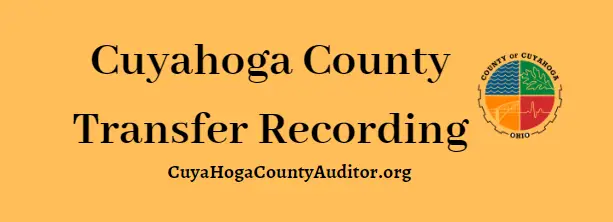In the realm of real estate transactions, transfer recording plays a pivotal role in ensuring the legitimacy and security of property ownership. Specifically, in Cuyahoga County, Ohio, transfer recording is a critical step in the process of documenting property transfers. Understanding the nuances and significance of transfer recording is essential for property buyers, sellers, and investors alike.
Cuyahoga County Transfer Recording
Transfer recording serves as an official documentation process that establishes legal ownership of a property. Without proper recording, the transfer of property might not be legally recognized. This crucial step helps in maintaining an accurate record of property ownership within Cuyahoga County.
Ensuring Legal Ownership
By recording property transfers, individuals can establish a clear chain of ownership, thereby mitigating disputes or claims on the property’s title. This process is vital for both residential and commercial properties, providing legal protection to all parties involved in the transaction.
Documenting Property Transactions
Moreover, transfer recording serves as a historical record of property transactions within Cuyahoga County. It helps in tracing the ownership history of a property, which can be valuable for future reference, research, or legal purposes.
Understanding Cuyahoga County Transfer Recording Process
To initiate the transfer recording process in Cuyahoga County, individuals must adhere to specific filing requirements and pay the requisite recording fees.
Filing Requirements
Typically, individuals need to submit various documents, including deeds, affidavits, and property descriptions, to the county recorder’s office. These documents must be accurately completed and signed by all relevant parties involved in the property transfer.
Recording Fees
Cuyahoga County imposes recording fees based on the number of pages and type of documents submitted for recording. These fees vary depending on the complexity of the transaction but are essential for processing and maintaining accurate records.
Conclusion
In conclusion, transfer recording in Cuyahoga County is a fundamental aspect of property transactions, ensuring legal ownership, documenting transactions, and providing a historical record of property ownership. Understanding the process and its importance can help individuals navigate real estate transactions more effectively and protect their property rights.
FAQs
-
Is transfer recording mandatory in Cuyahoga County?
Yes, transfer recording is mandatory to establish legal ownership of properties in Cuyahoga County.
-
What documents are required for transfer recording?
Documents such as deeds, affidavits, and property descriptions are commonly required for transfer recording.
-
Are there any exemptions from recording fees?
Certain exemptions may apply, such as transfers between family members or transfers related to inheritance.
-
How long does the transfer recording process take?
The processing time can vary but typically takes a few days to weeks, depending on the workload of the county recorder’s office.
-
Can transfer recording be done online?
Yes, Cuyahoga County offers online filing systems for transfer recording, providing convenience and efficiency to property owners.
